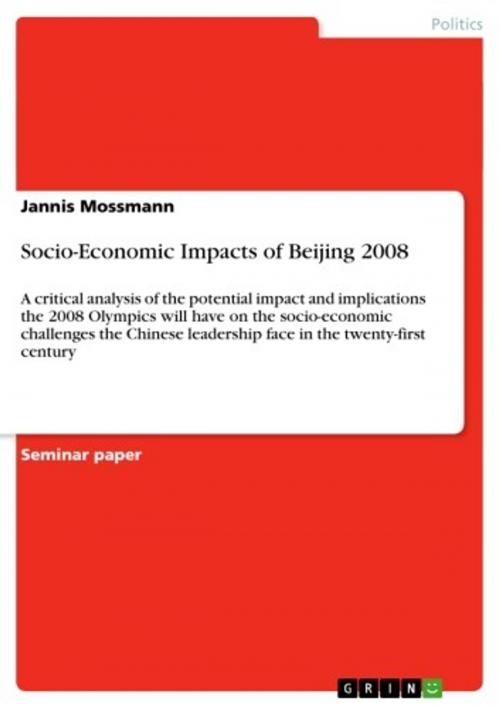Socio-Economic Impacts of Beijing 2008
A critical analysis of the potential impact and implications the 2008 Olympics will have on the socio-economic challenges the Chinese leadership face in the twenty-first century
Nonfiction, Social & Cultural Studies, Political Science| Author: | Jannis Mossmann | ISBN: | 9783638736787 |
| Publisher: | GRIN Publishing | Publication: | May 5, 2007 |
| Imprint: | GRIN Publishing | Language: | English |
| Author: | Jannis Mossmann |
| ISBN: | 9783638736787 |
| Publisher: | GRIN Publishing |
| Publication: | May 5, 2007 |
| Imprint: | GRIN Publishing |
| Language: | English |
Seminar paper from the year 2007 in the subject Politics - International Politics - Topic: Miscellaneous, grade: 58, Stellenbosch Universitiy, course: Political Economy of China, 21 entries in the bibliography, language: English, abstract: The next Olympic Games in Beijing 2008 are a major interest of the Chinese leadership. By 2008, China aims to have spent $35 billion on the games ('Beijing's Olympic', 2007), dwarfing the $8.7 billion spent by Greece. The Economist (2007) has calculated that this amount makes up more than 43 percent of the total for all the games, including Beijing, since Montreal's in 1976. The summer Olympics shall crown 30 years of successful economic reform. They will symbolize the outside world that China is on its way to reach world power status. The symbolic character to hold the world's biggest event seems to overshadow other impacts such an event can have (Owen, 2005). But, Uu Jingmin, vice chairman of the Beijing 2008 organizing committee, believes that the Olympics will contribute not only to economic development, it will bring also social progress for the whole country (in Hua, 2004). The Organization committee has proclaimed three major topics: the People's Olympics, the High-Tech Olympics, and the Green Olympics (Hua, 2004). But, it is highly controversial, if mega events are at the end economically and social beneficial for a venue city or not. The output of Olympic Games is 'incalculable, or, if calculable best considered as estimates only' (Hiller, 1998). At some points, the Olympics in Beijing can even lead to economic or social damage. To draw a conclusion about the whole range of impacts of global sports-events is difficult because of a lack of available data. Furthermore, China as a whole is still a developing country and faces massive socio-economic challenges. The impact of the Olympic Games will be small in regard to China's general socio-economic challenges facing Chinese leadership in the twentyfirst century. A final conclusion, how useful the Olympic Games will be outside the arena, especially in the long term, can be only drawn, when the games are already over. Anyway, this work shall clarify which impacts the Olympic Summer Games can have on China's social and economic challenges. Therefore, I split the essay in two parts. The first part will deal with economic impacts and implications resulting from Beijing's successful bid for the Summer Games. The second part describes social aspects of the Summer Olympics in Beijing. I try to describe not only the impacts on the challenges for China. The Chinese capital as venue deserved attention as well.
Seminar paper from the year 2007 in the subject Politics - International Politics - Topic: Miscellaneous, grade: 58, Stellenbosch Universitiy, course: Political Economy of China, 21 entries in the bibliography, language: English, abstract: The next Olympic Games in Beijing 2008 are a major interest of the Chinese leadership. By 2008, China aims to have spent $35 billion on the games ('Beijing's Olympic', 2007), dwarfing the $8.7 billion spent by Greece. The Economist (2007) has calculated that this amount makes up more than 43 percent of the total for all the games, including Beijing, since Montreal's in 1976. The summer Olympics shall crown 30 years of successful economic reform. They will symbolize the outside world that China is on its way to reach world power status. The symbolic character to hold the world's biggest event seems to overshadow other impacts such an event can have (Owen, 2005). But, Uu Jingmin, vice chairman of the Beijing 2008 organizing committee, believes that the Olympics will contribute not only to economic development, it will bring also social progress for the whole country (in Hua, 2004). The Organization committee has proclaimed three major topics: the People's Olympics, the High-Tech Olympics, and the Green Olympics (Hua, 2004). But, it is highly controversial, if mega events are at the end economically and social beneficial for a venue city or not. The output of Olympic Games is 'incalculable, or, if calculable best considered as estimates only' (Hiller, 1998). At some points, the Olympics in Beijing can even lead to economic or social damage. To draw a conclusion about the whole range of impacts of global sports-events is difficult because of a lack of available data. Furthermore, China as a whole is still a developing country and faces massive socio-economic challenges. The impact of the Olympic Games will be small in regard to China's general socio-economic challenges facing Chinese leadership in the twentyfirst century. A final conclusion, how useful the Olympic Games will be outside the arena, especially in the long term, can be only drawn, when the games are already over. Anyway, this work shall clarify which impacts the Olympic Summer Games can have on China's social and economic challenges. Therefore, I split the essay in two parts. The first part will deal with economic impacts and implications resulting from Beijing's successful bid for the Summer Games. The second part describes social aspects of the Summer Olympics in Beijing. I try to describe not only the impacts on the challenges for China. The Chinese capital as venue deserved attention as well.















